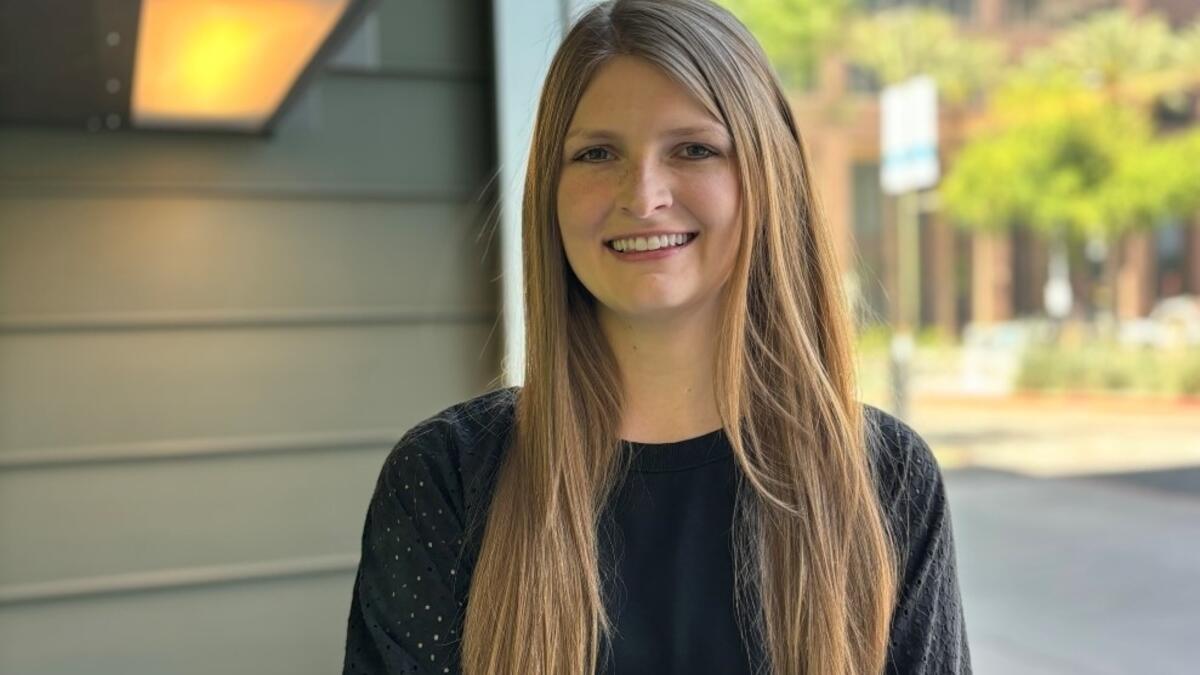Outstanding Graduate works to make change happen for communities with food insecurities

Tatum Dykstra is the College of Health Solutions' Outstanding Graduate Student for the 2024 spring semester.
By Aidan Hansen
Editor’s note: This story is part of a series of profiles of notable spring 2024 graduates.
Arizona native and College of Health Solutions grad student Tatum Dykstra has a passion for community work and wants to see positive change in low-income communities in the Valley.
Dykstra has earned a master’s degree in nutrition, and during her thesis, she analyzed topics relating to food insecurity throughout the Valley. She was also the lead author on a manuscript about how schools that participate in the U.S. Department of Agriculture’s Community Eligibility Provision, or CEP, had lower obesity rates than those that didn’t. The longer the CEP program was around, the more it helped the community.
Dykstra was chosen as College of Health Solutions’ Outstanding Graduate for the 2024 spring semester.
“I really wanted to be able to help the community and that was an opportunity through ASU,” Dykstra said. “I really enjoyed that experience of being able to help anyone in any way that I could.”
Dykstra has worked with St. Mary’s food distribution, as well as co-authoring a paper about different strategies the Inter Tribal Council could implement in the Arizona WIC program.
“When you hand out the food packages, you can see that they're really excited and appreciative of those foods to be able to eat for the week,” Dykstra said.
Question: What was your “aha” moment when you realized you wanted to study the field you majored in?
Answer: I've always been really interested in science and different biological and physiological processes. Then that kind of expanded further into the community and more of the public health sector. Then over time, understanding how different community and policy components can really affect individual health as well.
Q: Why did you choose ASU?
A: I wanted to come to ASU because of all the opportunities with research. That was really interesting to me. I also lived here in Arizona and I love the state and I wanted to stay close to home.
Q: What’s something you learned while at ASU — in the classroom or otherwise — that surprised you or changed your perspective?
A: I think through all the research opportunities I was surprised to learn how much I really enjoyed that process. And it changed my perspective by further learning about the importance of research as a mechanism for change.
Q: Which professor taught you the most important lesson while at ASU?
A: I would say Dr. Punam Ohri-Vachaspati, she is an exceptional mentor. I would say that one of the lessons that she taught me was the importance of nutrition research in helping to drive policy changes to positively affect health outcomes in communities.
Q: What was your favorite spot on campus, whether for studying, meeting friends or just thinking about life?
A: My favorite spot on campus anytime during the winter months was anywhere outside because of the great weather, and then I also just love being around all the beautiful landscapes and architecture at ASU.
Q: What’s the best piece of advice you’d give to those still in school?
A: I would say that my best piece of advice would be to find something that you enjoy learning about and that you love to study, as it helps make your college experience so much more rewarding.
Q: What are your plans after graduation?
A: The level of passion I have is why I am continuing my education and pursuing my PhD at ASU. I have been accepted into the program and will start in the fall of 2024. I'm really looking forward to being able to further develop my research skills and learn more about interdisciplinary approaches to health.
Q: If someone gave you $40 million to solve one problem on our planet, what would you tackle?
A: I would definitely say expanding food access and helping to make sure that healthy foods are available for all different types of communities.
More Health and medicine
College of Health Solutions program doing its part during Salute to Service
It wasn’t always easy for Marine veteran Chuck Hale when he first returned to civilian life. But he’ll never forget the help he received from a fellow former service member.“The first vet that helped…

What makes human culture unique?
Why is human culture — the shared body of knowledge passed down across generations — so much more powerful than animal cultures?“What’s special about our species?” is a question scientists have…

ASU honors students work on HPV research as part of Barrett College's largest-ever group thesis
Not every undergraduate student comes across the opportunity to do research as part of a team. Even fewer have had the chance to join a team of 86 students doing multidisciplinary research with real-…